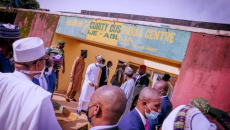Dr Eugene Juwah, executive vice chairman, Nigeria Communications Commission, NCC, discusses the exciting achievements of the commission in the past four years and the potential of the telecoms industry in Nigeria in the following interview with Anayochukwu Agbo, general editor, and Tajudeen Suleiman, senior associate editor
 What is your assessment of the revolution that has taken place in the Nigerian telecoms sector since 1999?
What is your assessment of the revolution that has taken place in the Nigerian telecoms sector since 1999?
All of us would like to remember where we’re coming from. And I like to tell the story of having to stay in Presidential Hotel, Port Harcourt in those days and you have to wake up by 3am to book an international call or receive an international call. People have fought there, wounded themselves and all that. Coming from there to where we are now that you can in your car call anywhere in the world. I have been roaming from Nigeria, and they can get me anywhere in the world, even in Trinidad, which is a small island. I thought that my phone won’t be able to roam in Trinidad. Although it didn’t roam automatically, I did it manually. But people were getting me in Trinidad as if I was in Nigeria. So the revolution is a real one starting from 2001 when GSM lines were issued. You will remember that we had only 400,000 lines then. You remember also in 2001 how much it cost to get a line. In Lagos, you got it for something like N200,000. In 2001, N200,000 was like N2 million today. You remember also that a minute of call at that time cost something like $2. Now you can get a line just by wishing it. Once you have a phone, SIM card is almost free. Calls overseas are very cheap; at times they’re cheaper than local calls. But having said this, remember that for five years running, Nigeria was the fastest growing telecommunications market in the whole world. It was just recently that we were surpassed by China and one other country. But as of today we are the fastest and biggest market in Africa. So we have done a lot since 1999, the revolution is real.
Since 2010, what would you consider the significant achievements made in the sector?
I have been on this seat for four and half years and I think we have made significant progress. Whenever you talk about telecommunications, you have to talk about statistics. We’ve improved the subscriber base in Nigeria from around 80 million in 2010 to more than 134 million today. It’s even more achievement if you take our progress from 2001 to 2011, which is a 10-year period. So I think our achievement in increasing the subscriber base in Nigeria is quite substantial, and it’s a feat. Between that 2010 and now, we are even growing faster than when we were number one in growth in the whole world. In teledensity too (the percentage of Nigerians that have telecommunications service), we have gone from 65 per cent to about 96 per cent today. If you look at foreign direct investment, the cumulative level of foreign direct investment from 2001 to 2010 was about $18 billion. But today we are more than $32 billion. Are we going to talk about the GDP? GDP in 2010 was 5 per cent. Today it is about 10 per cent. So from a statistical point of view we have done very well during this my tenure. If you come to innovations we have introduced SIM card registration which has provided a data base for the industry, for security. We have implemented the mobile number portability, which has deepened competition in Nigeria. Before, people were reluctant to move so that they don’t lose their numbers. But because we have introduced the mobile number portability, you can move if you don’t like your current operator and still keep your number. Prices have gone down over 45 per cent since 2010 because we have made a new determination for a new inter-connectivity – that is the rate at which operators exchange calls. We have deepened competition by looking at the market and trying to establish a better competitive environment, what I always refer to as a fair play in the field, by declaring operators with significant market power as dominant and placing restrictions on them by allowing smaller operators to grow. This is healthy in a competitive situation.
 How is government tackling the problem of inadequate infrastructure?
How is government tackling the problem of inadequate infrastructure?
It’s a big problem. What we did first was to inaugurate an industry working group for multiple taxation and regulation. An industry working group involves the whole industry – the regulator, the ministry and the operators – so that we can articulate the problem of multiple taxation and multiple regulations. After articulating all these, it was presented by the minister of communications to the National Economic Council, NEC; that’s where most of the governors that cause these problems are. And I can tell you that NEC approved the fees and the processes that were recommended by this industry working group. Although it has been approved, some of the governors still refused to implement them. The federal government has also drafted a bill – the Critical National Infrastructure Protection bill. We walk hand-in-hand with the industry working group to reinforce the decision of the working group so that when the bill is passed, it would prevent the state governments from just locking up base stations at will. It will prevent anybody at all, whether state government or individuals from interfering with telecommunications infrastructure. It will prescribe very severe penalty for anybody who contravenes the provisions of the bill. It will make it easier for operators to get site approvals and maintain their sites, which is not the same as at today. These are the interventions that government has been making in order to solve the problem of infrastructure with regard to multiple taxation and multiple regulations.
What impact are these developments in the telecoms sector making on the economy?
There is significant impact on our economy where as of today; the telecoms sector contributes 10 per cent of our GDP. Even the 10 per cent is conservative because this is just the output – revenue from telecommunications companies. If you take the linkages, for example, the efficiency telecommunications causes in other industries – banks, health, and aviation – you will see that probably the contribution in terms of GDP will be double of the 10 per cent. So the impact has been substantial, and it is poised to be more substantial with the advent of the broadband age. It has affected the ways in which people work. I was at home in Delta State and it was amusing to see a farmer going to his farm talking away on his bicycle! In our culture and lifestyle, it has brought substantial changes. It has also brought substantial employment, and has increased our knowledge base, our skill in technology.
What would you say are your major achievements?
I have enumerated them earlier. I came in 2010 and I’ve highlighted what we have achieved from the statistical point of view and from the regulatory point of view. All the new things we have introduced like the SIM card registration, mobile number portability, improvement in competition and so on and so forth. These are the marks of my tenure as chief executive.
What does the broadband revolution bring to the table for the sector?
It is so diverse but let me articulate a few aspects of it. Broadband is going to restructure the Nigerian telecommunications industry or the IT industry. The industry right now is on voice. Broadband includes voice, data and video. We have one platform called IP. For example, are we going to talk on its impact generally on our lifestyle? Or do we talk specifically on its impact on education? I remember, and I always tell this story; once I visited my relation in the US, and I saw his 12-year-old boy working on his iPad. And I was curious to see what he was doing. I could see that he was tasking something very complicated. And he said, “Uncle, come, you have a PhD, please come and help me out; I’m developing a widget.” I looked at what he was doing and I had very little clue. So I said sorry I can’t help you. And he joked, “And you say you have a PhD!” This was a 12-year-old boy and you see how he was able to develop himself just by knowledge from the Internet using his iPad. So it is a revolution that we are expecting in the knowledge area for our young and teeming youths. What about its impact on the health sector? If the doctors in Nigeria can’t cope they can link up with their partners in the US and they will see the patient completely as if he was in front of them. In the banking industry, bank branches are going to disappear; the banking system would be completely restructured so that you can stay at home with your phone and conclude your transactions and get confirmation. So it’s going to change our lifestyle completely. It is going to move us from an analogue lifestyle to a complete digital lifestyle. If we don’t do it now, we will be left behind. That is why it is timely to the objective of the NCC and to me as the chief executive that we start it right away and implement it without delay with all the resources that government has given to us.
What is the present broadband penetration in the country?
The penetration is around 6.1 per cent, and by government plan, by 2017 we need to move it to 30 per cent. The plan includes the building of infrastructure. We are going to license two infrastructure companies, one in the South and one in the North, to build the fibre infrastructure to carry broadband.
 A lot of subscribers feel that the NCC is too lenient with the operators…
A lot of subscribers feel that the NCC is too lenient with the operators…
Nigerians always think that because there is a call drop, you can close them down. It’s frustration but what people have to understand is that we are guided by law; anything we do must be in compliance with the law. Even when we penalise them, it has to be in compliance with the law. So it’s not like we are lenient, in fact if you ask the operators they think we are too hard on them but the consumers think we’re soft! That means we’re somewhere in the middle. I do not think we are lenient with the operators at all. We are the regulator; we stand between the operator and the consumer. The operator is an investor, and he expects to get returns from his investments. But we also, as regulators, want to regulate him in such a way that more investors would come. It is our duty to compel the operators to give the subscriber a better deal, and I think we have been doing that no matter what people feel. We have penalised them; we call them to order and all that. It’s not everything we do that is on the pages of the newspaper. When complaints reach us, we take it from there and I think at least 90 per cent of the complaints we get from subscribers we have resolved successfully with operators. One hundred and thirty-four million subscribers is a huge network, and there are bound to be hiccups. But what I always advise Nigerians is to weigh the efficiency of the telecoms operators against the general efficiency in the country – against our power, banking, aviation and all that. You cannot hold the operator responsible if, for example in Onitsha, somebody goes there and cuts his fibre. It may take him one day to fix it. You cannot blame an operator, for instance, who spent money to buy a generator, fills it with diesel, and somebody goes there overnight and sets fire to it. And I can tell you, a large portion of all the problems experienced by subscribers is due to all these infractions, not really due to capacity issues. There are capacity issues, and that is why when we believe there are capacity issues we penalise them. So I think it’s a wrong view to say NCC is too lenient with the operators.
Last December you were in Doha for a telecoms conference. What did Nigeria take away from that conference?
Well, the Telecom Watch, as it is called, is an IT event that takes place yearly. It is one of the major annual events and almost all countries are represented. So when you go there you have to tell your story and listen to the story of other people. You will see them and you will learn, this is how regulation can get better. We as regulators we listen to the story of other people. For example what we have in Nigeria that people don’t appreciate is that we have a regulator that the law says is independent. People take it for granted here, but if you see the struggle among other countries to get an independent regulator as we saw it in Doha, you will see that the government has done a lot for the Nigerian regulator. Because we can issue a licence without anybody telling us who; we can penalise an operator without anybody telling us don’t penalise them. It rests with the regulator, and it’s not just me, there are nine of us who constitute the Board of the Commission and we have to debate and vote. So this is one of the major things we gained from the conference. But also it gives us an opportunity to sell our country, to sell our industry, to address foreign investors. There was a major investment forum hosted by the commission and the Federal Ministry of Communication and Technology where big investors in the Arab world attended.
As the chief executive of NCC, how difficult or easy is your job?
Anybody who says that regulation is easy is not telling the truth. As the chief executive of an independent regulator you’re carrying the burden of the industry. The responsibility is quite a lot. Sometimes when there are issues, some people would say, cancel their licence. It’s because they haven’t thought it through.
What are the challenges you face in regulating the sector?
The challenge is letting Nigerians understand the challenges we have; that is our major challenge. To let Nigerians understand the challenges of the telecommunications industry and then see that first of all, there has to be drop calls. There is no mobile telecommunication in the whole world that doesn’t have drop calls. But it has to be limited, and we’re measuring it and trying to limit it. We’re trying to understand the problem that the industry goes through – the problem of multiple taxation, multiple regulations, none approval of sites and so on. Some of these problems are not really caused by the operators. When I say this some people think I am on the side of the operators but I have to say the truth.
Follow Us on Social Media


 WhatsApp us
WhatsApp us